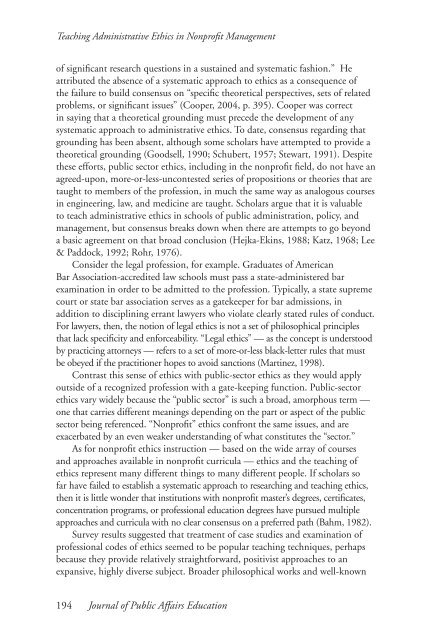JOURNAL OF PUBLIC AFFAIRS EDUCATION - Naspaa
JOURNAL OF PUBLIC AFFAIRS EDUCATION - Naspaa
JOURNAL OF PUBLIC AFFAIRS EDUCATION - Naspaa
You also want an ePaper? Increase the reach of your titles
YUMPU automatically turns print PDFs into web optimized ePapers that Google loves.
Teaching Administrative Ethics in Nonprofit Managementof significant research questions in a sustained and systematic fashion.” Heattributed the absence of a systematic approach to ethics as a consequence ofthe failure to build consensus on “specific theoretical perspectives, sets of relatedproblems, or significant issues” (Cooper, 2004, p. 395). Cooper was correctin saying that a theoretical grounding must precede the development of anysystematic approach to administrative ethics. To date, consensus regarding thatgrounding has been absent, although some scholars have attempted to provide atheoretical grounding (Goodsell, 1990; Schubert, 1957; Stewart, 1991). Despitethese efforts, public sector ethics, including in the nonprofit field, do not have anagreed-upon, more-or-less-uncontested series of propositions or theories that aretaught to members of the profession, in much the same way as analogous coursesin engineering, law, and medicine are taught. Scholars argue that it is valuableto teach administrative ethics in schools of public administration, policy, andmanagement, but consensus breaks down when there are attempts to go beyonda basic agreement on that broad conclusion (Hejka-Ekins, 1988; Katz, 1968; Lee& Paddock, 1992; Rohr, 1976).Consider the legal profession, for example. Graduates of AmericanBar Association-accredited law schools must pass a state-administered barexamination in order to be admitted to the profession. Typically, a state supremecourt or state bar association serves as a gatekeeper for bar admissions, inaddition to disciplining errant lawyers who violate clearly stated rules of conduct.For lawyers, then, the notion of legal ethics is not a set of philosophical principlesthat lack specificity and enforceability. “Legal ethics” — as the concept is understoodby practicing attorneys — refers to a set of more-or-less black-letter rules that mustbe obeyed if the practitioner hopes to avoid sanctions (Martinez, 1998).Contrast this sense of ethics with public-sector ethics as they would applyoutside of a recognized profession with a gate-keeping function. Public-sectorethics vary widely because the “public sector” is such a broad, amorphous term —one that carries different meanings depending on the part or aspect of the publicsector being referenced. “Nonprofit” ethics confront the same issues, and areexacerbated by an even weaker understanding of what constitutes the “sector.”As for nonprofit ethics instruction — based on the wide array of coursesand approaches available in nonprofit curricula — ethics and the teaching ofethics represent many different things to many different people. If scholars sofar have failed to establish a systematic approach to researching and teaching ethics,then it is little wonder that institutions with nonprofit master’s degrees, certificates,concentration programs, or professional education degrees have pursued multipleapproaches and curricula with no clear consensus on a preferred path (Bahm, 1982).Survey results suggested that treatment of case studies and examination ofprofessional codes of ethics seemed to be popular teaching techniques, perhapsbecause they provide relatively straightforward, positivist approaches to anexpansive, highly diverse subject. Broader philosophical works and well-known194 Journal of Public Affairs Education
















